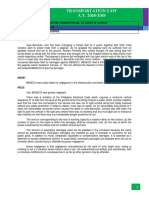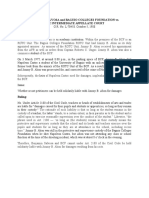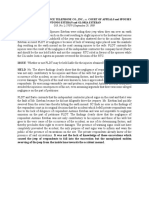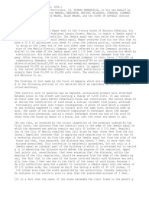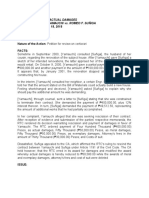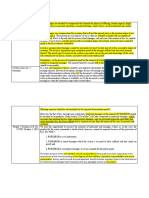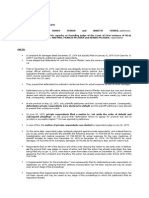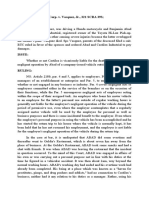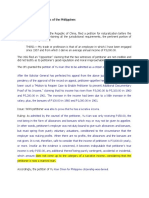Ong Vs Metropolitan
Ong Vs Metropolitan
Uploaded by
Johnny AltakiCopyright:
Available Formats
Ong Vs Metropolitan
Ong Vs Metropolitan
Uploaded by
Johnny AltakiOriginal Title
Copyright
Available Formats
Share this document
Did you find this document useful?
Is this content inappropriate?
Copyright:
Available Formats
Ong Vs Metropolitan
Ong Vs Metropolitan
Uploaded by
Johnny AltakiCopyright:
Available Formats
Ong vs metropolitan Facts: Dominador Ong, 14-year old son of plaintiffs, in company with two of his brothers went
to swim at the defendants swimming pool. After paying the admission fee they went to one of the small pools where the water was shallow. Later Dominador told his brothers that he was going to the locker room in an adjoining building to drink a bottle of coke. Upon hearing this, his two brothers went to the bigger pool. Later another boy in the swimming pool informed a lifeguard employed by the defendant that somebody was swimming underwater for quite a long time. The lifeguard immediately jumped into the big swimming pool and retrieved te apparently lifeless body of Dominador Ong from the bottom. Artificial respiration and a resuscitator were applied by employees of the defendant upon Dominador for the purpose of reviving him. A doctor was summoned by employees of the defendant to revive the boy but all to no avail. This action was instituted by the parents of the boy to recover damages from the defendant for the death of their son. Held: There is sufficient evidence to show that the defendant has taken all necessary precautions to avoid danger to the lives of its patrons or prevent accident which may cause their death. The swimming pools were provided with a ring buoy, toy roof, towing line, oxygen resuscitator and first aid medicine kit. The bottom of the pool was painted with black colors to ensure clear visibility. Rules and regulations were displayed in a conspicuous place. Six trained lifeguards were employed and their schedules were arranged so that tow guards were on duty at a time. A male nurse, a sanitary inspector and security guards were also employed. When the body of Dominador was retrieved the employees of the defendant did everything possible to bring him back to life. Under these circumstances the defendant proved that it did what was humanly possible to restore the life of the deceased. Defendant was, therefore, absolved from liability to the plaintiffs. PNB vs Pike Facts: Norman Pike often traveled to and from Japan as a gay entertainer in said country. Sometime in 1991, he opened U.S. Dollar Savings Account with PNB Buendia branch for which he was issued a passbook. The complaint alleged that before Pike left for Japan on 18 March 1993, he kept the passbook inside a cabinet under lock and key,in his home. A few hours after he arrived from Japan, he discovered that some of his valuables were missing including the passbook; that he immediately reported the incident to the police which led to the arrest andprosecution of a certain Mr. Joy Manuel Davasol. Pike also discovered that Davasol made 2 unauthorized withdrawals from his U.S. Dollar Savings Account. Pike went to PNBs Buendia branch and verbally protested the unauthorized withdrawals and likewise demanded the return of the total withdrawn amount of U.S. $7,500.00, on the ground that he never authorized anybody to withdraw from his account as the signatures appearing on the subject withdrawal slips were clearly forgeries. PNB refused to credit said amount back to Pikes U.S. Dollar Savings Account , and instead, the bankwrote him that it exercised due diligence in the handling of said account.Pike filed a case against PNB. PNB, on the other hand, claimed that before Pike went to Japan, he andDavasol went to see PNB AVP Mr. Lorenzo Val and
instructed the latter to honor all withdrawals to be made byDavaso l. After the loss of Pikes passbook, he allegedly withdraw the balance from his passbook and executed an affidavit promising not to hold responsible the bank and its officers for the withdrawal made.The trial court ruled that the bank is liable for the unauthorized withdrawals. The bank was negligent inthe performance of its duties such that unauthorized withdrawals were made in the deposit of Pike. The CA affirmed the findings of the RTC that indeed defendant-appellant PNB was negligent in exercising the diligence required of a business imbued with public interest such as that of the banking industry, however, it modified the rate of interest and award for damages. Issue: Whether or not the bank is liable HELD: Yes. PNB was held liable due to the negligence of its employees in allowing the unauthorized withdrawal. This was shown by the lackadaisical attitude of its employees in treating Pike's US dollar account, an act which resulted to the loss of $7,500. Such warrants for the award of damages. The slips used were in breach of the standard operating procedure of the bank in the ordinary and usual course of business. Even if it is the employees who are negligent, the bank's liability as the obligor is not merely vicarious but primary since banks are expected to exercise the degree of diligence in the selection and supervision of their employees.
You might also like
- Monthly Statement: Name Address Account Number Statement PeriodDocument18 pagesMonthly Statement: Name Address Account Number Statement PeriodAlexander Weir-WitmerNo ratings yet
- Assignment On Negotiable Instruments ActDocument6 pagesAssignment On Negotiable Instruments ActBitthal Sharma50% (2)
- Swift Customer Security Program ProtivitiDocument3 pagesSwift Customer Security Program ProtivitihumdilNo ratings yet
- 015 San Miguel Corp V CADocument2 pages015 San Miguel Corp V CAPhillipCachaperoNo ratings yet
- Cases Taxation 1Document32 pagesCases Taxation 1Michelle Valdez AlvaroNo ratings yet
- Carson Realty V Red RobinDocument3 pagesCarson Realty V Red RobinSJ StarNo ratings yet
- CD - 49. Bengued Electric Cooperative Inc. vs. Court of Appeals Et Al., G.R No. 12736 23 Dec 1999Document1 pageCD - 49. Bengued Electric Cooperative Inc. vs. Court of Appeals Et Al., G.R No. 12736 23 Dec 1999MykaNo ratings yet
- DIGESTDocument7 pagesDIGESTSometimes goodNo ratings yet
- Tison Et Al. V Sps. PomasinDocument4 pagesTison Et Al. V Sps. PomasinGillian Alexis ColegadoNo ratings yet
- Finals CasesDocument7 pagesFinals CasesBianca Marie FlorNo ratings yet
- Lambert Vs CAstillonDocument2 pagesLambert Vs CAstillonKling KingNo ratings yet
- Case No. 156 - Salvosa Vs IACDocument1 pageCase No. 156 - Salvosa Vs IACMargie Marj GalbanNo ratings yet
- Torts & Damages HomeworkDocument14 pagesTorts & Damages Homeworksheena LesNo ratings yet
- Cuara Vs Monfort - Vicarious LiabilityDocument1 pageCuara Vs Monfort - Vicarious LiabilityJulioNo ratings yet
- Franco V IacDocument1 pageFranco V IacNīc CādīgālNo ratings yet
- PLDT vs. Sps. EstebanDocument1 pagePLDT vs. Sps. EstebanClioNo ratings yet
- Child Learning CenterDocument11 pagesChild Learning CenterJacques Andre Collantes BeaNo ratings yet
- S2-B2 Cruz vs. CA, 282 SCRADocument1 pageS2-B2 Cruz vs. CA, 282 SCRAMarisse CastañoNo ratings yet
- Soliman V TuasonDocument1 pageSoliman V Tuasonlovekimsohyun89No ratings yet
- Makabali To Trans-AsiaDocument9 pagesMakabali To Trans-AsiaMikee TuasonNo ratings yet
- Torts Notes CompilationDocument91 pagesTorts Notes Compilationautumn moonNo ratings yet
- Dingcong vs. CanaanDocument1 pageDingcong vs. CanaanPia SarconNo ratings yet
- 1 Manila Electric V RemoquilloDocument5 pages1 Manila Electric V Remoquilloemmyrea.eNo ratings yet
- Transportation Case Digest: Calvo V. UCPB Gen Insurance Co. (2002)Document3 pagesTransportation Case Digest: Calvo V. UCPB Gen Insurance Co. (2002)jobelle barcellanoNo ratings yet
- Transpo Case DigestDocument5 pagesTranspo Case DigestAlyssa Mae BasalloNo ratings yet
- Torts CasesDocument45 pagesTorts CasesMary Therese Gabrielle EstiokoNo ratings yet
- DE VERA Vs SANTIAGODocument2 pagesDE VERA Vs SANTIAGOShai NavarroNo ratings yet
- Torts Case Digest 4Document19 pagesTorts Case Digest 4Emjie King100% (1)
- Martin Vs CA 205 Scra 591Document1 pageMartin Vs CA 205 Scra 591tochiNo ratings yet
- G.R. No. 171845 - Case DigestDocument2 pagesG.R. No. 171845 - Case DigestKristine MorillaNo ratings yet
- 46 RecitDocument2 pages46 RecitSara Andrea SantiagoNo ratings yet
- GR No. 168512 Garcia v. Salvador, 20 March 2007Document2 pagesGR No. 168512 Garcia v. Salvador, 20 March 2007Niña VillegasNo ratings yet
- Ponente: MARTIRES, J. Nature of The Action: Petition For Review On Certiorari FactsDocument24 pagesPonente: MARTIRES, J. Nature of The Action: Petition For Review On Certiorari FactsGrace De LeonNo ratings yet
- Case Doctrines - DamagesDocument10 pagesCase Doctrines - DamagesJoseph John Santos RonquilloNo ratings yet
- Ferrer Vs ErictaDocument2 pagesFerrer Vs ErictaDanny DayanNo ratings yet
- Ylarde V AquinoDocument3 pagesYlarde V AquinoCamille BritanicoNo ratings yet
- Layugan vs. IAC G.R. No. 73998 November 14, 1988 Sarmiento, J. Second Division Negligence Res Ipsa Loquitur FactsDocument8 pagesLayugan vs. IAC G.R. No. 73998 November 14, 1988 Sarmiento, J. Second Division Negligence Res Ipsa Loquitur FactsSenri ShimizuNo ratings yet
- #5 Tamargo Vs Court of Appeals 209 SCRA 518Document10 pages#5 Tamargo Vs Court of Appeals 209 SCRA 518Ta Jose100% (1)
- 4 Gatchalian VDocument2 pages4 Gatchalian VJemNo ratings yet
- Limited Partnership CompressDocument12 pagesLimited Partnership CompressLove RosieNo ratings yet
- Heck Vs GamotinDocument5 pagesHeck Vs GamotinFred Michael L. GoNo ratings yet
- Castilex Industrial CorpDocument10 pagesCastilex Industrial CorplordonorNo ratings yet
- 37 - First Integrated Bonding Insurance Co vs. HernandoDocument1 page37 - First Integrated Bonding Insurance Co vs. HernandoN.SantosNo ratings yet
- Sanitary Steam Laundry Vs CA PDFDocument11 pagesSanitary Steam Laundry Vs CA PDFAriel Conrad MalimasNo ratings yet
- Bustamante Vs CADocument2 pagesBustamante Vs CAwesternwound82No ratings yet
- Chailese Development CompanyDocument8 pagesChailese Development CompanyPat PoticNo ratings yet
- INOCENCIO ROSETE vs. Auditor General (Special Agent)Document2 pagesINOCENCIO ROSETE vs. Auditor General (Special Agent)Dom Robinson BaggayanNo ratings yet
- Semblante Et Al., vs. Court of Appeals, Et Al.Document2 pagesSemblante Et Al., vs. Court of Appeals, Et Al.Marinelle Aycee Moleta PerralNo ratings yet
- 07 Li V SolimanDocument103 pages07 Li V SolimanJanlo FevidalNo ratings yet
- Tort and DamagesDocument3 pagesTort and DamagesAndrea DeloviarNo ratings yet
- Gilchrist V. Cuddy (Jon) : Torts and Damages - Atty. AbañoDocument17 pagesGilchrist V. Cuddy (Jon) : Torts and Damages - Atty. AbañoHerzl Hali V. HermosaNo ratings yet
- Rosendo C. Carticiano and Zacarias A. Carticiano vs. Mario NuvalDocument2 pagesRosendo C. Carticiano and Zacarias A. Carticiano vs. Mario NuvalKalliah Cassandra CruzNo ratings yet
- 12 First Integrated Vs HernandoDocument2 pages12 First Integrated Vs HernandoPiaNo ratings yet
- Concepcion - Allied Banking Corp V BPIDocument1 pageConcepcion - Allied Banking Corp V BPIElaizza ConcepcionNo ratings yet
- Rosit V DR Gestuvo DigestDocument3 pagesRosit V DR Gestuvo DigestAnonymous 0AiN3tNo ratings yet
- 12 Lambert v. Heirs of CastillonDocument13 pages12 Lambert v. Heirs of CastillonBerNo ratings yet
- Yu Kian Chie Vs RoPDocument1 pageYu Kian Chie Vs RoPAnneNo ratings yet
- Fuellas Vs CadanoDocument4 pagesFuellas Vs CadanoMutyaAlmodienteCocjinNo ratings yet
- South African Airways V CIR G.R. No. 180356 - February 16, 2010 - Velasco, JR., JDocument4 pagesSouth African Airways V CIR G.R. No. 180356 - February 16, 2010 - Velasco, JR., JgabbyborNo ratings yet
- Malipol v. TanDocument13 pagesMalipol v. TanJoseph Adrian ToqueroNo ratings yet
- (B32) LAW 104 - Picart v. SmithDocument3 pages(B32) LAW 104 - Picart v. SmithmNo ratings yet
- 055 G.R. No. L-7664 August 29, 1958 Ong Vs Metropolitan Water DistrictDocument4 pages055 G.R. No. L-7664 August 29, 1958 Ong Vs Metropolitan Water DistrictrodolfoverdidajrNo ratings yet
- Ong CaseDocument5 pagesOng CaseaudyNo ratings yet
- Direction: Follow The Given Directions Below. Make Sure The Turtle Reach The PondDocument2 pagesDirection: Follow The Given Directions Below. Make Sure The Turtle Reach The PondJohnny AltakiNo ratings yet
- Basco Et Al VsDocument6 pagesBasco Et Al VsJohnny AltakiNo ratings yet
- Republic vs. Santos IIIDocument3 pagesRepublic vs. Santos IIIMike CatNo ratings yet
- Board of Assessment Appeals Vs Manila Electric CompanyDocument2 pagesBoard of Assessment Appeals Vs Manila Electric CompanyJohnny AltakiNo ratings yet
- Elcano Vs HillDocument1 pageElcano Vs HillJohnny AltakiNo ratings yet
- Iifl Gold LoanDocument59 pagesIifl Gold LoanTabrej Khan75% (4)
- TicketDocument1 pageTicketsureshraparla999No ratings yet
- HDMF MPL With ThumbmarkDocument2 pagesHDMF MPL With ThumbmarkAimee HallNo ratings yet
- W14.1 CLCK53 Compare and Contrast Essay InclassDocument9 pagesW14.1 CLCK53 Compare and Contrast Essay InclassTiệp Vũ0% (1)
- Long Quiz in Abm003Document4 pagesLong Quiz in Abm003glenisedelacruzNo ratings yet
- KPMBM Academic Schedule Jan-June 2015Document33 pagesKPMBM Academic Schedule Jan-June 2015Nur Salfaezan Mohd PilusNo ratings yet
- Prudential Bank V Panis 153 SCRA 390 1987Document6 pagesPrudential Bank V Panis 153 SCRA 390 1987Bonito BulanNo ratings yet
- FinTech Consumer Lending in NigeriaDocument47 pagesFinTech Consumer Lending in NigeriaADEWOLE EMANUELNo ratings yet
- StandardAndPoors Corporate Ratings Criteria PDFDocument114 pagesStandardAndPoors Corporate Ratings Criteria PDFAnonymous fjgmbzTNo ratings yet
- Schedule - Specimen of Statement of Significant Accounting PoliciesDocument16 pagesSchedule - Specimen of Statement of Significant Accounting Policiesav_meshramNo ratings yet
- Land Bank of The Philippines V. Narciso L. Kho G.R. No. 205839 July 07, 2016Document3 pagesLand Bank of The Philippines V. Narciso L. Kho G.R. No. 205839 July 07, 2016Michael Vincent BautistaNo ratings yet
- Namma Kalvi 12th Accountancy Unit 1 Sura English Medium GuideDocument25 pagesNamma Kalvi 12th Accountancy Unit 1 Sura English Medium GuideAakaash C.K.100% (2)
- Banking Industry in IndiaDocument18 pagesBanking Industry in IndiaSajna NadigaddaNo ratings yet
- CPT Mock QuestionDocument40 pagesCPT Mock QuestionAbhimanyu Kumar PatelNo ratings yet
- Account StatementDocument12 pagesAccount StatementMuhammad imranNo ratings yet
- Account STMT XX2570 01042024Document3 pagesAccount STMT XX2570 01042024vickyraodongraNo ratings yet
- ProjectDocument76 pagesProjectDashing HemantNo ratings yet
- General Knowledge 1stDocument2 pagesGeneral Knowledge 1stlucasNo ratings yet
- Ca in NoidaDocument9 pagesCa in NoidaVirender RawatNo ratings yet
- PLI1MF Bank Branch CodeDocument12 pagesPLI1MF Bank Branch Coderajib64522No ratings yet
- Coop Bank Kenya Tariff-GuideDocument1 pageCoop Bank Kenya Tariff-GuideSamuel Kamau100% (2)
- Unit 2Document11 pagesUnit 2fekadegebretsadik478729No ratings yet
- Allied Bank of PakistanDocument47 pagesAllied Bank of Pakistanmuhammadtaimoorkhan78% (9)
- Financial Accounting: Reference Books: Accountancy by D. K. Goel Rajesh Goel OR Double Entry Book Keeping by T. S. GrewalDocument27 pagesFinancial Accounting: Reference Books: Accountancy by D. K. Goel Rajesh Goel OR Double Entry Book Keeping by T. S. GrewalBhawna SinghNo ratings yet
- TEE Land IPO - Prospectus (29 May 2013)Document409 pagesTEE Land IPO - Prospectus (29 May 2013)Invest StockNo ratings yet
- Estmt - 2024 04 01Document6 pagesEstmt - 2024 04 01duo.wu94No ratings yet
- The Role of Internet Banking and Society: C.A.Mahesh Kumar, Y.Lokesh Kumar Reddy, B.SreenivasuluDocument9 pagesThe Role of Internet Banking and Society: C.A.Mahesh Kumar, Y.Lokesh Kumar Reddy, B.SreenivasuluPavan PaviNo ratings yet






